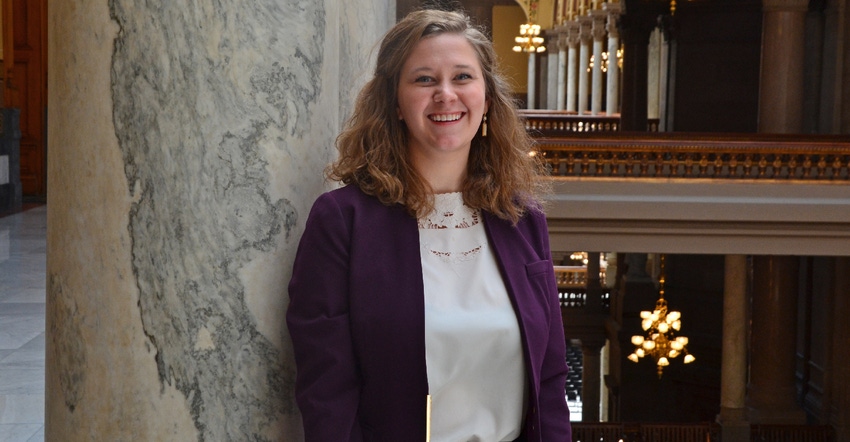December 23, 2020

Misperceptions can harm the validity, truth and success of the agriculture industry.
“So often, we like to say the ag industry, agriculture as a whole, is one industry,” says Samantha Miller, Indiana FFA director. “And that’s true, and it really should be true. But then we have issues with, ‘Well, they’re organic and I’m not organic’ or ‘They’re non-GMO and I love GMOs.”
Miller previously was an agriculture teacher at Hamilton Southeastern High School. She explains that her goal is to make Indiana a better place for everyone.
Miller addresses misperceptions and biases people hold against other people. “Misperceptions are things we all carry around, whether we truly recognize them or not,” she says. “Sometimes we don’t recognize that we’re treating someone differently because they carry one of the traits we just don’t like. Sometimes we do, but we try to justify it.”
Related: Young leader issues her own challenge to ag industry
These unrecognized thoughts often lead to implicit actions of racism, sexism or discrimination. Many people aren’t discriminatory on purpose; however, these thoughts can lead to underlying behaviors that are discriminatory. That’s why it’s vital to acknowledge and overcome these thoughts. Empathy, self-reflection and education are three powerful tools that help Miller shift the way she thinks about, talks about and treats people who are different from her.
“Having biases against other people for qualities that they can’t control, which then leads to including people and having empathy, really shouldn’t be politicized,” she says. “This is an issue we need to take from the political sphere, and we need to own it as a nonpolitical issue — we need to own it as something that is a personal issue.”
Here’s a closer look at the tools Miller uses to address biases and misperceptions:
Empathy. Miller believes empathy can go a long way and shows this belief through the self-reflection and education she has done to diminish her biases. She describes the value and importance of putting yourself in someone else’s shoes to help and understand people with different stories and perspectives.
“To be actually good people, we have to be empathetic, and to actually be empathetic, we have to recognize what those biases are,” Miller says.
She warns that not doing the hard work of unlearning biases can turn into sympathy rather than empathy. Sympathy is defined as “feelings of pity and sorrow for someone else’s misfortune.” Empathy is defined as “the ability to understand and share the feelings of another.”
It isn’t enough anymore to feel bad for minorities, underrepresented groups or those treated without justice, she believes. People must dig deeper to truly understand others. Only then will people understand what it’s like to walk in someone else’s shoes.
Self-reflection. Miller has done a lot of self-reflection and self-education to understand what biases, misperceptions or preconceived notions she holds, and what she can do about them. She believes people must be willing to be vulnerable with themselves and ask the hard questions.
“It takes a lot of conscious work to get rid of your biases,” Miller says. “It’s not something where you just read a book and you’re all done. It’s not a checkmark, it’s a journey. It takes a lot of time and hard work to get there. It might take your whole life to get there.”
Self-reflection allows people to understand what biases they have, why they have them and what they should do about them, she believes.
Education. “To know where you’re going, just like a map, you have to know where you came from,” Miller says. “To know where you come from, I think that there’s a lot with our history that’s been whitewashed, or we’ve been taught some basic facts but not the ‘why’ behind the basic facts.”
Miller refers to the 1619 Project, which discusses discrimination against Black farmers. She describes how a lot of this discrimination still happens today, but it just looks different, which is why addressing history is vital.
“You can’t just ignore your history,” Miller says. “I think you have to recognize what it was, good or bad, but you have to recognize it in its whole, and you can’t just cherry-pick what you want to think about. And you have to sometimes unlearn things you’ve been taught because you just didn’t have the whole picture before.”
The myths and misperceptions held for the agriculture industry can hurt the industry’s success just as myths and misperceptions held for underrepresented groups can hurt their livelihood. A lot of time is spent debunking myths about farmers, GMOs and agricultural practices. Miller asks how often the same effort, passion and education are exerted to debunk myths for other groups of people?
Honest conversations change people, institutions and industries, and Miller believes it’s time the agriculture industry has the uncomfortable conversation of addressing misperceptions about others and what should be done about them.
Jogi is a senior in agricultural communication at Purdue University.
You May Also Like




